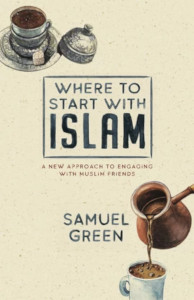I have been looking forward to the release of Sam Green’s Where to Start with Islam (2019) for some time. I first came into contact with Sam’s training on evangelising Muslims at a university conference in 2005, and have found what I learned from him extremely useful over the years. Sam’s influence eventually became foundational to the Stretch training seminar that I teach on Islam. This book did not disappoint my high expectations and I hope that it will be read very widely.
Why another book on Christianity and Islam?
Modern Christians are blessed with a large number of high-quality resources on Islam. The best detailed book is James White’s What Every Christian Needs to Know about the Qur’an (2013) – highly recommended. Richard Shumack’s The Wisdom of Islam and the Foolishness of Christianity (2014) compares the philosophical and theological differences between Islam and Christianity in ways that are very useful for evangelism. Mark Durie has written excellent books of the differences between the god portrayed in the Qur’an and the true and living God of the Bible (Which God?, 2014), as well as an important book on the historical subjugation of conquered Christians and Jews in Islamic societies (The Third Choice, 2010). The list of useful and worthwhile books on Islam goes on and on. There is no shortage of bibliography I could recommend!
Even so, I believe that Sam’s book, as it’s title states, is now the place to start for Christians who want to share the gospel with Muslims. This book belongs at the top of the pile. Why?
One of the biggest problems for Christians learning about Islam is memory retention. Unless you are talking to Muslims regularly you forget most of what you learn from a book or seminar – “use it or lose it”! Most of us have experienced the frustration of information laying just beyond recollection when needed in conversation. Furthermore, it is rare to meet a “textbook” Muslim, whose personal practice and understanding is a straightforward example of the Islam that you learned about. People are like that. Muslims, like Christians, differ enormously in their relative levels of commitment and the quality of their understanding of their own religion. So when we find ourselves with a gospel-opportunity with a Muslim, not only might we forget our training, but we might find that what we have learned doesn’t connect with the particular Muslim we are talking to.
Sam’s approach overcomes much of this difficulty by beginning with what all Christians should expect to know, namely their own faith. He recommends that Christians begin by learning what the Qur’an claims about Christianity and moving from there.
Every Christian should read chapter 3, “Sharing the gospel with a Muslim”. In short, Islam claims to follow ‘all the prophets’ and yet Muslims only listen to Muhammad, ignoring the book that has all the prophets in it – the Bible! The Bible’s table of contents is a sermon in itself to many Muslims who are unaware that the writings of those prophets mentioned in the Qur’an are in the Christian Bible. Simply changing our terminology from “Bible” (which most Muslims believe to be corrupted) to “Torah, Prophets, Law, and Gospel” (which the Qur’an affirms) goes a long way to convincing Muslims that they really ought to read the Christian Scriptures for themselves.
Guidance for Fruitful Dialogue
The book covers many of the key topics on which Christians and Muslims disagree. I appreciate the way in which Sam explains complex doctrinal ideas in a way that can be used in ordinary conversations. For example, when defending the divinity of Jesus, Sam recommends discussing the way in which God connects with his creation. God is ‘connected’ to creation in many ways: creating and sustaining it, his omnipresence (God is everywhere in creation), and in his revealing himself by his word [ch.4]. If God connects with creation in so many ways, then on what basis can we say that God cannot connect with his creation through uniting divine and human natures in Jesus? This line of thinking helps Christians think through their own theology, and is sufficiently down-to-earth for ordinary conversation. Likewise, chapter 5 gives helpful directions on how to discuss the Trinity in terms of the relationship between ‘oneness’ and ‘distinctions’ in God. This language can be equally applied to Christian and Islamic theologies and helps avoid talking past one another.

One part of the book that will surprise some is Sam’s argument that the Qur’an probably does teach that Jesus died on the cross [ch.7]. Most Muslims understand Sura 4:157 as saying that Jesus didn’t die, and Muslims have many theories of how this occurred (e.g. an illusion, someone else crucified instead, etc). But as Sam points out, the language of this passage is consistent with the language of martyrdom used elsewhere in the Qur’an. In light of this, it is likely that the Qur’an is claiming that Jesus died a martyr of Islam and was then taken directly up to heaven by Allah. These observations might lead to some productive conversations on the death of Jesus: why it matters whether he died or not, and what the Bible claims about it’s historical reality and theological significance.
In sum, this book is both an extremely valuable resource for understanding Islam from a Christian perspective, as well as a practical training tool for evangelism. Each chapter ends with a summary of key points and some common Muslim objections to Christianity, along with directions for briefly answering them. The book also directs readers to Sam’s website Engaging with Islam for further reading and free resources to share with Muslim friends.
The best thing about this book is the way that it revolves around the gospel. Interfaith debates too easily get lost in entrenched disagreements about minutiae. This book helps Christians maintain a focus on the bigger goal: trying to help Muslims to engage with the Bible itself, and to encounter glorious gospel of Jesus that it contains.
Christians, read this book. Pastors, recommend it to your churches (read it first). Run training on it. And perhaps Matthias Media could be persuaded to produce study material to accompany it?
This book deserves the widest possible audience. May it bear much fruit for God’s Kingdom.
